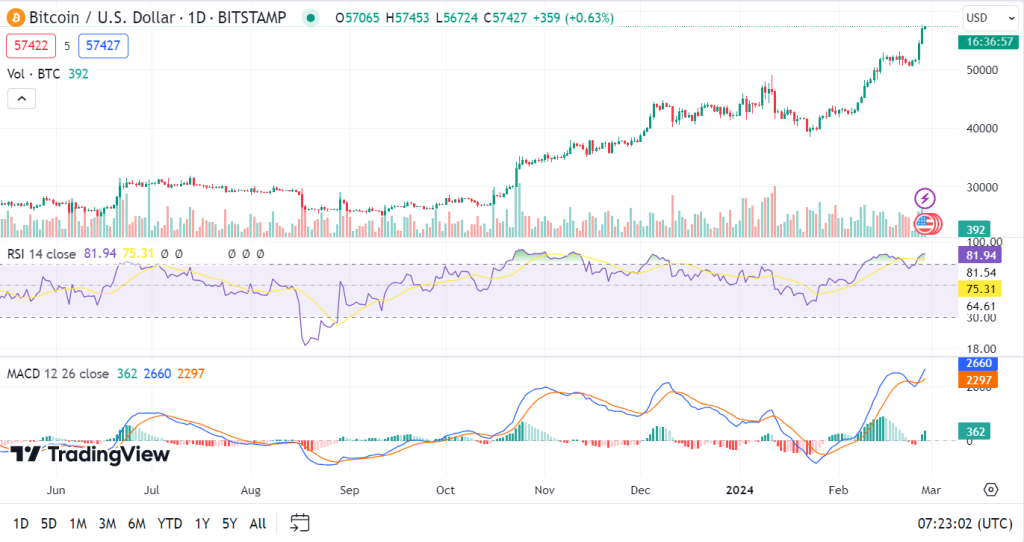- Bitcoin’s bullish momentum persists, but high RSI levels suggest caution amidst potential overbought conditions.
- Market indicators, including moving averages and MACD, support continued upward movement, but volatility remains a concern.
- The Time & Cycles theory projects a bull market ending in December 2025, but market dynamics could alter this trajectory.
Washigorira, an analyst, has recently speculated about the potential duration of Bitcoin’s bullish cycle, highlighting the current positive momentum in the Bitcoin market. With Bitcoin’s price soaring to $59,266.34 and exhibiting a 5.39% increase in the last 24 hours, coupled with a staggering trading volume of $39 billion, it’s evident that the cryptocurrency continues to capture significant attention. However, amidst this fervor, questions arise regarding the duration of the bull market cycle and whether it might conclude earlier than anticipated.
Investors find themselves at a crossroads as they analyze various indicators. The 1-Day RSI currently stands at 81.94, suggesting the market’s potential overbought status and hinting at a looming correction alongside the upward trend indicated by the moving averages. The 50 EMA’s recent crossover above the 100 and 200 EMAs signals robust bullish momentum, reinforcing optimism among traders. Moreover, the 1-Day MACD aligns with this sentiment, supporting the possibility of continued upward movement in Bitcoin’s price.

Despite these encouraging signs, prudence dictates a cautious approach. While indicators paint a picture of strength in the market, the high RSI level raises concerns about potential profit-taking and a subsequent short-term pullback. Such fluctuations are characteristic of Bitcoin’s volatile nature and are not uncommon during bull cycles. Consequently, investors are advised to remain vigilant and strategically manage their positions to navigate potential market corrections effectively.
Furthermore, the timeline projected by the Time & Cycles theory, forecasting the end of the bull market in December 2025, presents an intriguing perspective. However, with the dynamic nature of cryptocurrency markets, deviations from established patterns are plausible. Factors such as regulatory developments, macroeconomic shifts, and technological advancements could significantly influence market dynamics, potentially accelerating or decelerating the cycle’s duration.
While the Time & Cycles theory offers valuable insights, it’s essential to remain adaptable and responsive to evolving market conditions. Flexibility in strategy and a keen awareness of market indicators will be paramount in navigating the uncertainties inherent in the cryptocurrency landscape. As the Bitcoin journey unfolds, investors must remain informed, resilient, and prepared to seize opportunities amidst market fluctuations.






